A month after a dramatic, last-minute assault on their budget from Mayor Ted Wheeler, staff and advisors for the Portland Bureau of Transportation are coming to terms with reality and trying to forge a path forward.
At a meeting of the PBOT Bureau Budget Advisory Committee (BBAC) Thursday night, committee members plotted next moves and bent the ear of one notable attendee — City Commissioner Mingus Mapps. Mapps, who leads PBOT, needs the BBAC now more than ever. He’s desperate. His largest bureau is in freefall and so far he hasn’t found a parachute.
In addition to current funding woes, PBOT is without a director and suffers from low morale after years of cuts, a recent strike, and harsh daily criticism from a public that once adored them. Meanwhile, key metrics like bicycling rates and traffic deaths are headed in the wrong direction. Mapps tried his best at last night’s meeting to balance candor about the severity of the moment with the positive, inspirational tone it will take to get out of it.
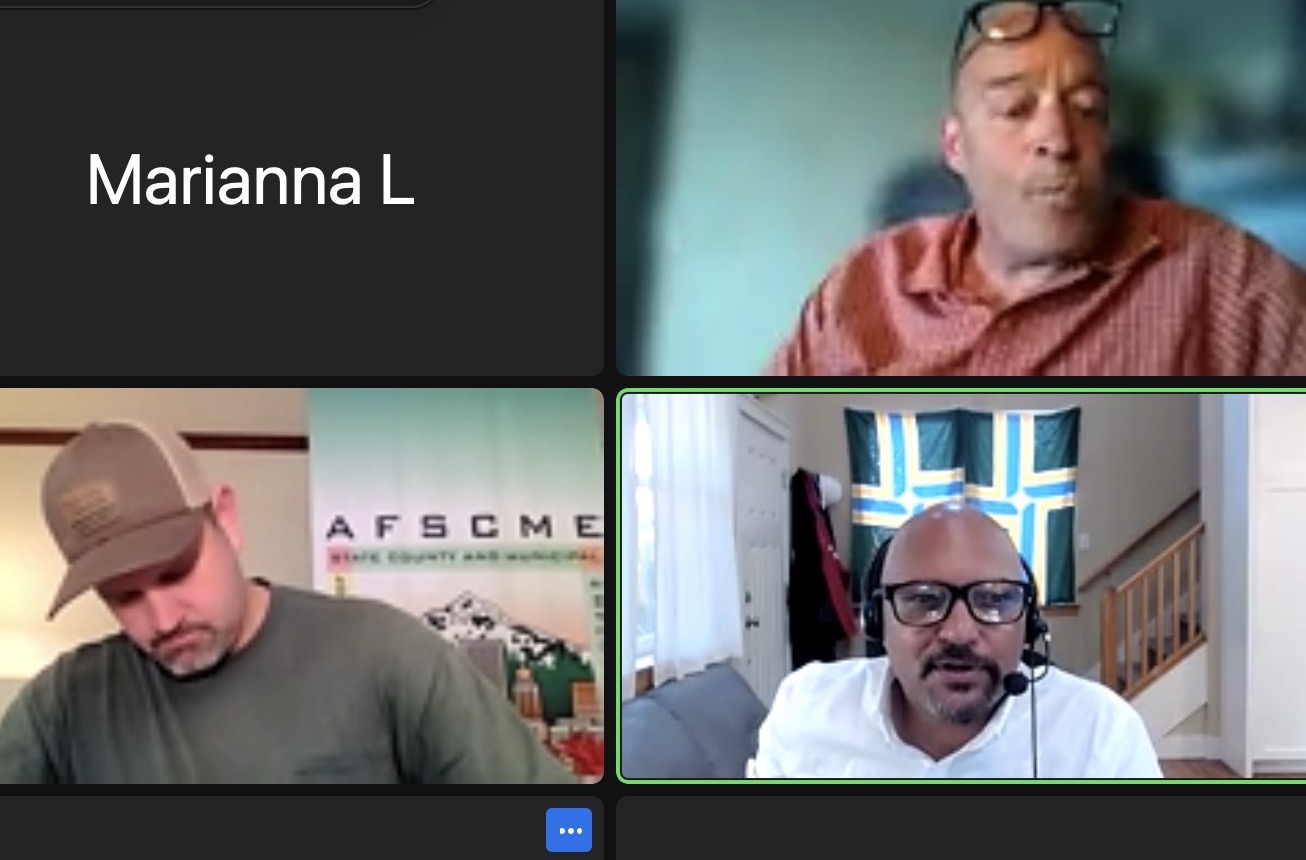
“We are beyond band-aids, now we are doing surgery. And frankly, we’re gonna’ have to find a cure if we’re going to get transportation back on on its feet,”
– Mingus Mapps, city commissioner
“We are beyond band-aids, now we are doing surgery. And frankly, we’re gonna’ have to find a cure if we’re going to get transportation back on on its feet,” he said. And then added, “We are very privileged to be the folks in the transportation space. We get to figure out what this next moment looks like.”
PBOT’s funding problem is not new. It comes from decades of propping up a system that requires more funding than the agency brings in and relies too heavily on driving-related fees — which is the agency’s lowest stated priority. It was a slow-moving train wreck before Covid, then the pandemic — and more recently, politics — hastened a derailment.
Bureau leaders thought they had a bit more breathing room before last month when Mayor Wheeler ambushed their budget. A 40-cent parking meter increase that was already voted on and set to go into effect next month would have staved off the most brutal cuts for at least year. Then Wheeler said he wanted the money back because tax increases are “choking the life out” of Portlanders. Mapps was able to broker a compromise (thanks in large part because labor unions flooded City Hall with concerns) and a 20-cent increase was ultimately adopted.
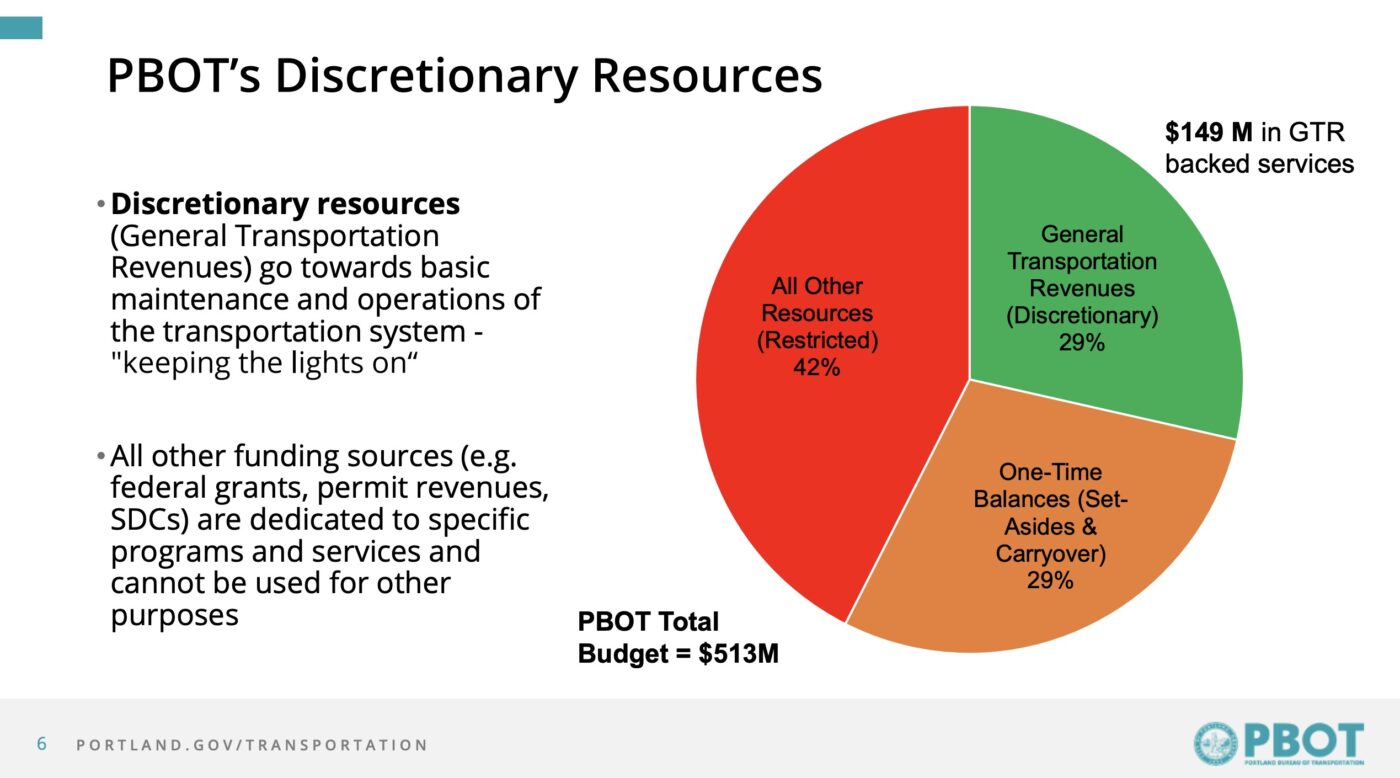
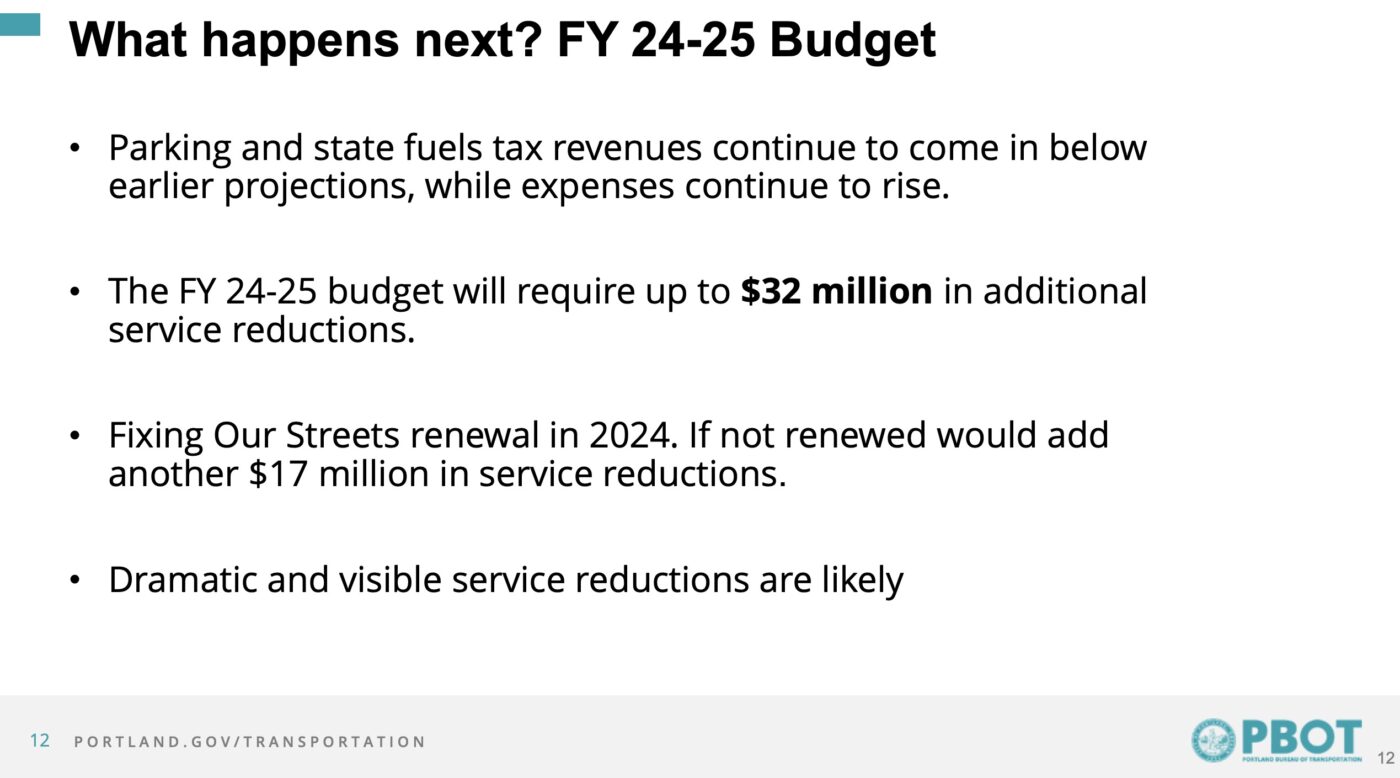
PBOT Business Services Group Director Jeremy Patton shared last night that receiving half as much from the parking meter increase as they’d expected will mean an additional $4 million of cuts per year starting the fiscal year that begins July 1st 2023 and runs through June 31st, 2024. When added to other cuts into a long-term forecast, Patton said starting in 2024-2025, PBOT will need to cut $32 million a year — an amount equal to about 30-35% of their discretionary, “keeping the lights on” budget. “That is pretty significant,” Patton said with admirable calm.
Mapps wasn’t as measured. “I don’t think my colleagues realize the degree to which the actions they took are going to have some really detrimental impacts on our community,” he said.
The BBAC can help by applying political pressure through writing letters and meeting with other commissioners and their staff. The committee has drafted several letters. They differ in tone, but the asks are the same: reinstate the initial 40-cent parking meter increase, expand paid parking zones to areas outside the central city (like Hawthorne, Division, and so on), and move forward with a transportation utility fee (which Mapps floated briefly last month).
There’s long been dissatisfaction among PBOT advisory committee members that they have limited impact on policy decisions. That idea is being tested like never before at the BBAC right now, and this budget crisis might be the thing that helps them finally mature into a more influential body. They are certainly talking the talk.
“I think we need to push back hard on this thought that we can just cut PBOT’s budget at the last minute and it’s going to be cool,” said BBAC member David Stein. He’s among several committee members who want to sharpen the BBAC’s tone. “These cuts are endangering the economic health of the city and the actual physical safety of citizens and in the long run, they will cost taxpayers more money,” said BBAC co-chair Susan Johnson.
And Ignacio Simon, the most outspoken member of the committee, wrote in a draft letter, “The citizenry should not have to beg its government to act in the city’s best interest.”
What is the city’s best interest? That of course is open for debate.
Simon, Stein, and other members of the BBAC think now is the time to transition PBOT away from their car-centric funding model (based on gas taxes and parking fees) and its perverse incentives that tie the agency to its avowed enemy.
When Simon told Mapps he was concerned that PBOT’s budget is too tied to driving, the commissioner agreed. “Ironically even as we win, we lose,” Mapps replied. And then he asked Simon, “What alternative funding mechanisms appeal to you?”
Simon said he’d like to see new fees and taxes that would disincentivize people from driving large vehicles. He also said he supports the transportation utility fee and more paid parking areas citywide — an idea Mapps said PBOT “will be exploring.”
Parking fees aren’t the only thing Mapps will explore in the coming months. He and his team at PBOT are laying groundwork to renew the Fixing Our Streets local gas tax increase first passed by voters in 2016. It’s due for a vote next year and there’s a lot of talk about what to put on the ballot. Should PBOT ask for more than 10-cents? Should they try to index the amount to inflation? Should they remove the four-year term?
PBOT Resources Manager (and veteran of many funding debates over the years) Mark Lear said, “We joke around about going from Fixing Our Streets II, to Fixing Our Streets forever.” He also added that PBOT’s preferred approach would be to index the gas tax to inflation, even though Portland would be the first city in Oregon to do so.
Mapps liked the indexing idea too. After one BBAC member suggested indexing parking fees and the local gas tax to inflation, Mapps said, “I like those ideas. That’s one thing which I think we need to change.”
Amid all this, PBOT has been directed by city council to update their strategic plan to (in Mapps’ words), “find a closer relationship between the bureau’s mission and the resources we have.” Will doing that lead to any changes? “I’m a little skeptical,” Mapps said about the exercise. “I think our core plan is still sound and I can’t imagine us moving away from any of our core missions.”
Instead of changing the goalposts, Mapps wants to change how the game is played. “The elephant in the room is PBOT’s broken and outmoded mechanism for funding itself. I think this is a moment when we as a city need to come together and figure out how we’re going to fund transportation for the 21st century.”
Mapps’ first test will be during next year’s budget talks when he plans to go after the city’s general fund dollars to help keep PBOT afloat. One of PBOT’s afflictions is how very little of their funding comes from the (highly competitive) general fund and can’t be used for maintenance and everyday operational expenses. When he makes major general fund requests next year, Mapps thinks it will, “Profoundly change the dynamics” at city council.
“They’re not going to like that,” Mapps said about his general fund strategy. “And I think it will create some incentives for my colleagues to get PBOT back on sound financial ground, because once PBOT moves into the general fund you’re competing… everyone is going to have to sacrifice to make our transportation system work.”
From here, PBOT will roll out a public opinion poll and do outreach to help them craft the right package of cuts that will balance their budget while they continue to consider new revenue ideas. That will lead them right into conversations about the 2024-2025 budget with city councilors later this fall.
There are many important conversations in the weeks and months ahead that could change PBOT forever. Stay tuned.



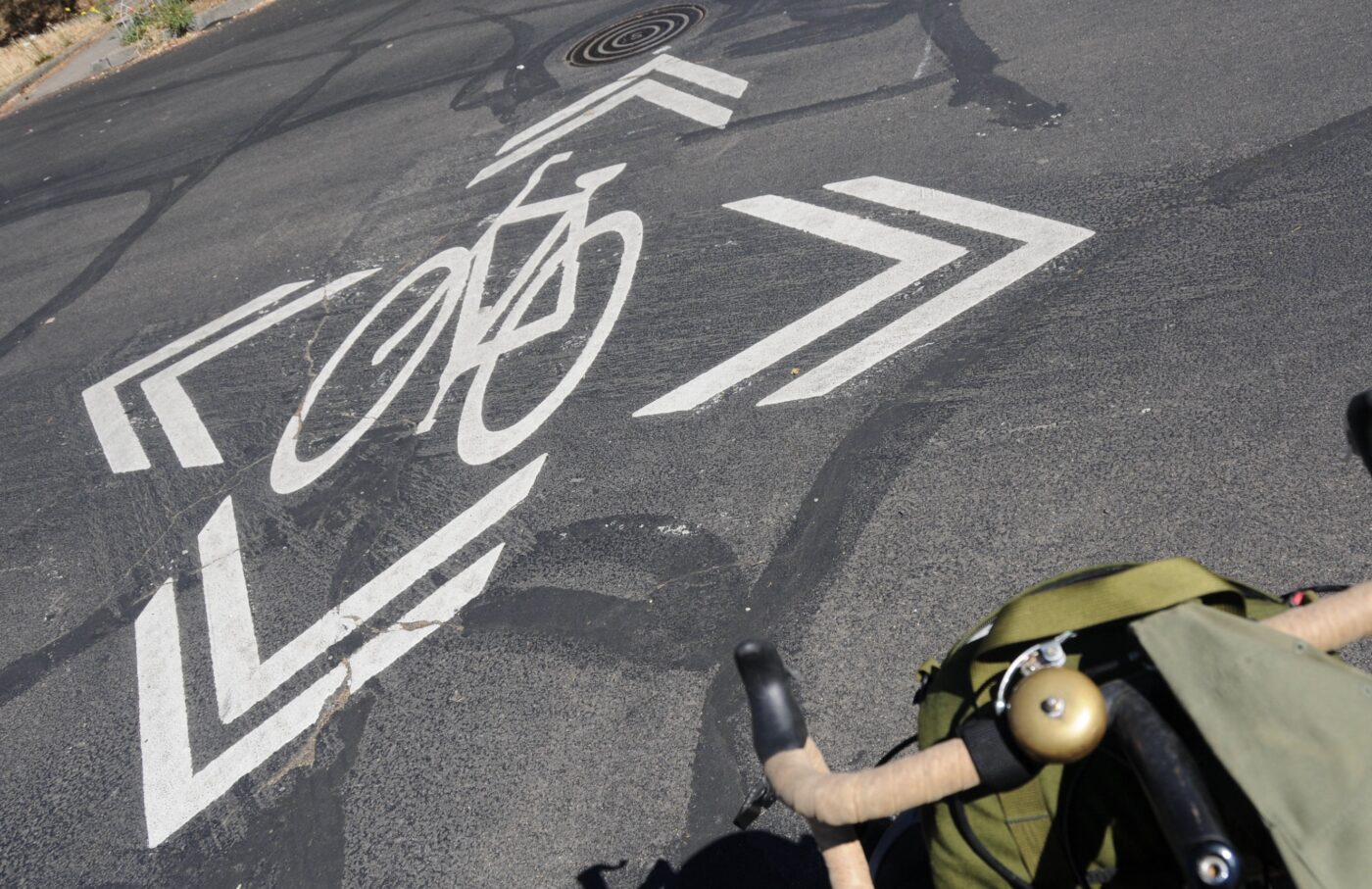
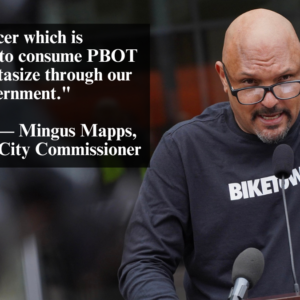

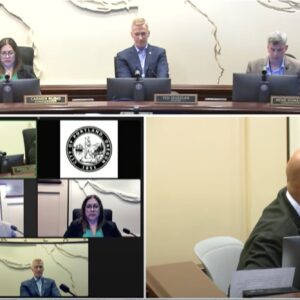

Thanks for reading.
BikePortland has served this community with independent community journalism since 2005. We rely on subscriptions from readers like you to survive. Your financial support is vital in keeping this valuable resource alive and well.
Please subscribe today to strengthen and expand our work.
PBOT (and the city) has no overall strategy on how to increase modal share (Let’s assume the 2030 bike plan is dead since it has virtually no bearing on transportation decisions). PBOT has no plan to develop a protected bike network. The city/PBOT does not have one commissioner (including Mapps) or staff who talk about a separated network. They might get more support to increase their revenue from street safety advocates, if they had a plan. Currently, it seems their plan is to scatter a piecemeal group of unconnected projects across the city with little to no research on how this effects ridership and safety. PBOT is rudderless.
It’s been clear for a very long time that PBOT is not going to be building a separated bicycle network.
PBOT did not create Portland’s bicycle boom, they did not destroy it, and it will not be the ones to build it back better.
The city council and PBOT managers simply don’t care about increasing modal share. Not only is it not on their to-do-list but it’s not something they think about at all.
Put PBOT as a division of Parks & Recreation and redefine car driving and car parking as recreational pursuits.
I don’t see much of a way out, sadly. I think Portlanders are feeling tax fatigue, and I do not think renewal of the gas tax is guaranteed, much less some new “utility fee”.
PBOT hasn’t done much to endear me to them over the past decade, so it’s hard for me to get too worked up over this. I’d like to see a disinterested party enumerate what would likely need to be cut, so we can have a rational discussion about what we want and how much it costs.
Of course there is local tax fatigue . Look at the Preschool tax—it’s overflowing with millions yet only a few are getting free preschool. Bad taxes like this limit our ability to tax for needed essentials such as a safer, greener transportation system. .
https://www.wweek.com/news/2023/02/09/preschool-for-all-tax-coffer-overflows-as-wealthy-payers-reap-capital-gains/
The homeless services tax is even more fatiguing in its own way, since it targets high-income earners who control the fate of organizations in Portland. These leaders are moving their businesses out of Portland to avoid paying the tax, which has started a vicious downward spiral (fewer businesses = less tax revenue). I think that’s what Wheeler is really worried about, but he’s not allowed to attack the homeless-services tax, for obvious reasons, so he goes after the 40-cent parking fee.
The Preschool Tax also hits “high earners” (single filers making greater than $125,000 and joint filers > $200,00). Portlanders voted for a lot of poorly planned (and now poorly executed) taxes because they thought it wouldn’t affect them. Turns out they were wrong.
If we had more parks/ green spaces as part of our transportation system, the budget for transportation could be spread more broadly across bureaus and draw more broadly from funding agencies outside of Portland.
Portland has oodles of tax money. We just spend it on “non-essentials”. Look no further than the Portland Clean Energy Fund (PCEF). $118 million in 2022.
https://www.portland.gov/bps/cleanenergy/2022-pcef-rfp-2-grant-recipients
I have an idea to fill PBOT’s budget gap – ticket cars parked in bike lanes.
Ticket all expired plates.
Here’s the issue. Portlanders have decided to fund so many taxes there is now too much tax fatigue to fund needed transportation maintenance and improvements. We should have thought of this before we voted for the “feel good” measures that were not well planned and have been poorly executed (Homeless Tax, Preschool Tax, PCEF Tax, Housing Bond Measure). Unless we repeal some of these taxes, we’re sort of stuck. Unfortunately the huge flow of taxpayer cash has created aggressive constituencies for each of these taxes (they are enjoying the millions of dollars) and will fight tooth and nail to prevent its redirection to essential services.
It’s too bad that PBOT has a proven record of not being successful on garnering “aggressive constituencies” to defend and preserve past tax efforts on funding street repair such as the ULF. If city council can take away a funding source for general use “in an emergency”, they generally will declare an emergency ASAP.
City Council is PBOT’s worst enemy – any effort by PBOT to raise revenue from any source that Council can legally take it away, will ultimately be taken away, since all past efforts were. They even tried to take away parking revenue – only gas tax is legally sacred.
PBOT has been doing this annually for decades. The problem is, whatever conclusions PBOT has gets watered-down by a combination of senior staff worried about their continued employment and by city council itself, and so no solution is ever implemented.
Basically, the city can’t afford to maintain the city street infrastructure it already has, let alone add new stuff. So it keeps plodding on, patching this and abandoning that.
End stage ‘murrican capitalism. I’m cheering on its slow-moving collapse.
Let’s all move to Russia!
Russian capitalism has far more in common with oligarchical ‘murrican-style capitalism than the many social democracies that value public education, public transportation, public healthcare, public housing and other aspects of a basic social safety net.
Hopefully someone in Mapps’ office or BBAC will look to other states or countries for ideas. https://ncchamber.com/2022/06/29/celebrating-a-win-sustainable-diversified-revenue-for-transportation/ In North Carolina: The state is committing to allocate a percentage of … tax collected for transfer from the state’s General Fund to the Highway Fund and the Highway Trust Fund. The transfer would be marked at 2 percent in the 2023 fiscal year, 4 percent in 2024, and 6 percent in 2025 and thereafter. The revenue is split at 25 percent to the Highway Fund and 75 percent to the Highway Trust Fund. As growing numbers of motorists adopt electric vehicles (EVs) and vehicle manufacturers commit to ever-higher EV production targets, traditional funding options like the motor fuels tax are becoming less and less viable. And unfortunately, …any DOT… is highly dependent on the motor fuels tax to fund transportation projects
All county roads and many urban arterial and collector stroads are owned by the state DOTs in VA, NC, & WV, a holdover policy from the 1930s Depression. Unfortunately, NC has a state law since 2002 that forbids state revenue from being used on bicycle and pedestrian infrastructure, which is now entirely funded with federal grants and local revenues. On the plus side, the state DOT actually owns several major railroad lines (which they rent out to corporate Norfolk & Southern) and is pretty generous in subsidizing rail maintenance, local and regional passenger service, railroad bridges, and rolling stock upgrades.
It’s long past time for a congestion fee in Portland. You wanna drive in the city? Then pay by the mile. Really we need a pay-by-the-mile system in all of Oregon.
Tough times take extraordinary cohesive leadership and vision…either in the form of a strong visionary mayor OR for weak mayor/ commission form of government, a well coordinated vision with its policy and budget linked with its impacted department.
In the case of Transportation it is hobbled right now not by their overall quality but that 5 of the 6 important positions (top 5 + parking) are still ‘interim’ in status. Interim leaders just cannot pull the weight politically and internally that they could otherwise.
https://www.portland.gov/transportation/director/executive-team
[Perhaps the only other worse case scenario is what the City of Vancouver USA has been muddling along with: a short term or unfilled / open public works director since 2020 after ~35 years of stability.]
Radical idea, I know, but I think it’s time to charge for all on-street parking in the city. Not much, just $5 to $10 a month to be able to park for more than, say, 4 hours on the street no matter where you are, in areas that are currently free to park. Or it could just apply to overnight parking. In any case, half the cars would immediately disappear into people’s driveways and garages, finally showing us the true “demand” for on-street parking and probably freeing up more roadway space for bike lanes, and people who don’t have off-street parking would benefit in currently parking-congested areas, having an easier time finding a spot. This would end the expectation that it should be free to store one of your most valuable possessions on public property, and would bring in a fair amount of revenue. PBOT would probably say that enforcement citywide would be a huge challenge, but it doesn’t have to be. Just do it like a transit agency does, where you randomly enforce one part of town each day. As long as there is a decent, non-zero chance that you might get hit with a huge fine (more than a year’s worth of parking fees), most people will follow the rules.
I wouldn’t mind paying, but if I do, I would want my spot to be reserved for me. Heck, I’d be willing to auction spots off to make sure we get the true market value for them. I’ll bet some are worth far more than $5/month, and an auction would let us find out.
Time to eliminate some middle-management. Focus funding on the staff that actually repair the roads, and spend less on managers. Most organizations are management heavy.
What about a luxury car tax that could be levied during registration via the DMV. then funneled back to PBOT for cars registered in Portland?
Does PBOT get any $ from the city from traffic fines? If so, they lost revenue during the pandemic. Also, when I was hit by a car in a x-walk, the driver broke 3 laws and no citations were given and no fines paid.
It’s not taxes that’s chocking the life out of Portlanders, it’s cars. Pick any residential street in most Portland neighborhoods and they’ll be cars parked on both sides of the street,
Maybe require a monthly and//or yearly parking pass. This could be sliding scale or have low income exceptions.
I grew up in a place where you get pulled over and fined for not having a muffler or having an exceptionally loud vehicle.